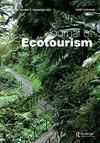The environmental dimension of ecotourism in Italian protected areas: a comparison of two bio-geographical regions based on the assessment of accredited hiking guides
IF 2.4
Q2 HOSPITALITY, LEISURE, SPORT & TOURISM
引用次数: 2
Abstract
ABSTRACT Ecotourism is increasing in protected areas but assessing its sustainability and contribution to nature conservation remains a challenging task. Guides, located at the interface between various stakeholders (park managers, local communities and tourists), can provide insight into the environmental dimension of ecotourism. However, people may perceive the value of natural ecosystems differently, according to the bio-geographical regions in which they live. In this study, 109 questionnaires (36% response rate) obtained from guides operating in protected areas of two different bio-geographical regions in Italy – the Alps (temperate) and Apennines (Mediterranean) – were analysed. All guides acknowledged the key role of protected areas and the importance of sustainable tourism for nature conservation. Differences emerged over issues such as the perception of the ecological impact of forestry or the reasons tourists choose to visit protected areas. Whereas in the temperate region ecotourism is mainly focused on the enjoyment of outdoor recreation, in the Mediterranean region, the discovery of villages and local and organic food represent relevant attractions. Guides are pivotal in raising tourist awareness of sustainability, explaining biodiversity conservation strategies and reducing ecotourism’s ecological footprint. However, findings reveals that up-to-date training in conservation ecology is necessary to achieve environmental sustainability goals.意大利保护区生态旅游的环境层面:基于认证徒步导游评估的两个生物地理区域的比较
摘要生态旅游在保护区日益增多,但评估其可持续性和对自然保护的贡献仍然是一项具有挑战性的任务。导游位于各种利益相关者(公园管理者、当地社区和游客)之间的界面,可以深入了解生态旅游的环境层面。然而,根据人们生活的生物地理区域,人们可能会对自然生态系统的价值有不同的看法。在这项研究中,分析了从意大利两个不同生物地理区域——阿尔卑斯山(温带)和亚平宁山脉(地中海)——保护区的导游那里获得的109份问卷(36%的回复率)。所有导游都承认保护区的关键作用以及可持续旅游对自然保护的重要性。在对森林生态影响的看法或游客选择参观保护区的原因等问题上出现了分歧。在温带地区,生态旅游主要侧重于享受户外娱乐,而在地中海地区,发现村庄以及当地和有机食品是相关的吸引力。导游在提高游客对可持续性的认识、解释生物多样性保护战略和减少生态旅游的生态足迹方面至关重要。然而,研究结果表明,为了实现环境可持续性目标,有必要进行最新的保护生态学培训。
本文章由计算机程序翻译,如有差异,请以英文原文为准。
求助全文
约1分钟内获得全文
求助全文
来源期刊

Journal of Ecotourism
Social Sciences-Geography, Planning and Development
CiteScore
6.40
自引率
12.50%
发文量
32
期刊介绍:
The Journal of Ecotourism seeks to advance the field by examining the social, economic, and ecological aspects of ecotourism at a number of scales, and including regions from around the world. Journal of Ecotourism welcomes conceptual, theoretical, and empirical research, particularly where it contributes to the dissemination of new ideas and models of ecotourism planning, development, management, and good practice. While the focus of the journal rests on a type of tourism based principally on natural history - along with other associated features of the man-land nexus - it will consider papers which investigate ecotourism as part of a broader nature based tourism, as well as those works which compare or contrast ecotourism/ists with other forms of tourism/ists.
 求助内容:
求助内容: 应助结果提醒方式:
应助结果提醒方式:


